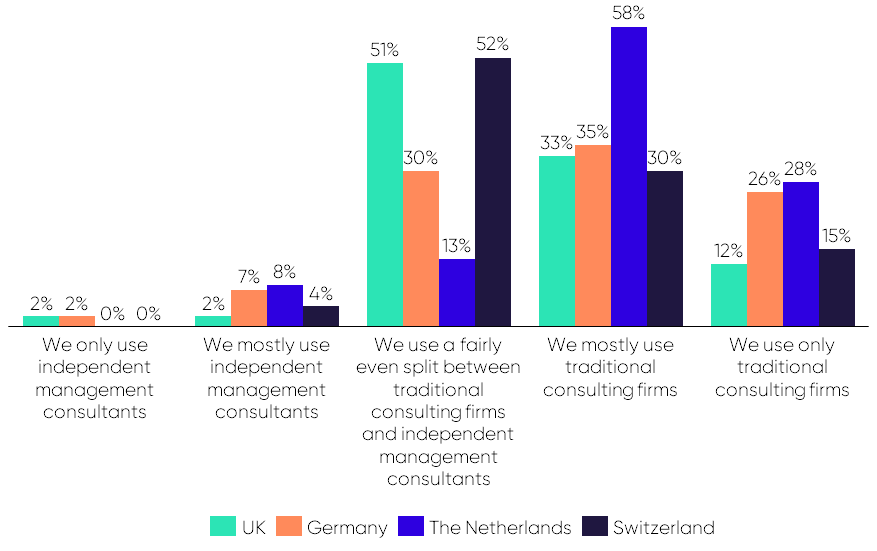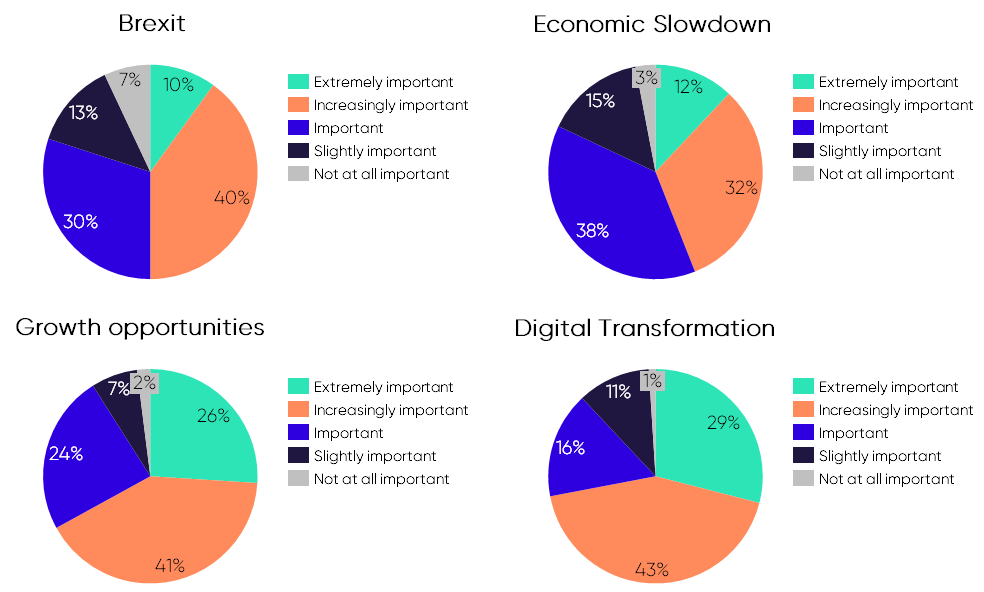The increasing speed of innovation and digitalisation mean that organisations need ever greater business agility. Rapid access to specialised skills and additional change capacity are more critical to businesses than ever. This trend is shifting the power balance towards the individual in turn fueling the gig economy.Gig workers emerge specifically as an effective, talented and, perhaps most importantly, under-utilised workforce segment¹. Being able to access talent when needed, and flexibly scaling up or down when required, is a huge advantage in dynamic business environments.
Use of the open-talent ecosystem is therefore on a rapid growth trajectory. Businesses are discovering the benefit it offers over traditional employment or consulting services options and learn how to access it successfully. While the adoption is growing across Europe we see that growth is faster in some countries than others revealing some useful insights.
UK and Switzerland leading the way in leveraging the open-talent economy
In Europe, the markets that stand out in terms of leveraging the gig economy for consulting services are the United Kingdom and Switzerland². In the United Kingdom, 55% of companies report to use independent consultants approximately as much as big firms or more. Meanwhile, Germany and especially the Netherlands stick to traditional consulting firms much more than their European counterparts. In the Netherlands a whopping 81% still mostly or only uses traditional consulting firms.

Figure 1: To what extent does your organisation, in your opinion, buy consulting support from traditional management consulting firms and from independent consultants?
Source: Adapted from OdgersConnect 2017
The search for ever more flexible, low cost, and quality services
When asked why organisations find appeal in the open-talent economy, the answer is the same across markets. Flexibility is a key reason to work with independents instead of traditional consulting firms. This can be seen from two aspects. Firstly, rather than taking on large transformations programmes with a large commitment and lock-in to a single firm up front, many businesses are adopting agile processes, breaking unwieldy programmes into bite-sized chunks thus enabling the use of multiple providers and access to independent specialists. Secondly, clients want to remain in the driver seat of their initiatives. Bringing on large teams from a single provider clients can lose control of the thinking and direction. Engaging highly independent talent does not have this risk.
The second key reason comes from access to better price points (where businesses in The Netherlands, counts this as the primary reason). Access to skills and experience from the open talent ecosystem without paying for the overhead of a consulting brand is a major advantage of the open talent market.
The open-talent economy as a new competitive dimension in the Digital age
The obvious question is where the difference between the UK and Netherlands is coming from. One perspective could be that UK organisations are operating in a more turbulent market environment. This requires more flexibility and digital capabilities to survive. This view is supported by research from OdgersConnect³, where the need to find new opportunities for growth, addressing digital transformation, anxiety over Brexit and economic slowdown were named as key factors in driving demand for independent consultants. The lower cost expertise that the open-talent economy brings could have been more crucial to the UK market in the past years. However it seems unlikely that this is the sole explanation. The past preference of Dutch organisations to stick with their traditional consulting partners may also has a regulatory or cultural link. Regardless of the reasons, it leaves untapped potential in the Netherlands compared other markets.

Figure 3: Key factors driving companies demands for independent consultants in the UK. Source: Adapted from Consultancy UK 2017, taken from OdgersConnect, 2017
On-demand economy will become mainstream for contingent workforce management
Going forward, the volume of the gig economy will only further increase; According to MBO partners⁴, in less than 10 years 60% of the workforce will be considered independent professionals. This means that the open-talent economy is here to stay. However for organisations to increasingly take advantage of it some barriers need to be overcome. One big factor slowing companies down is difficulties with quality control, named by 31% of organizations as a deterrent. The open-talent network is immense, which makes finding high-quality professionals with appropriate skills difficult and time consuming.
At the moment most organisations still use personal connections and recommendations from trusted peers to find the right talent. But with the increase in demand particularly in areas such as digital and data analytics this is soon becoming unsustainable. Next to that working within a more flexible and open talent model requires organisations to organise their contingent workforce differently. Instead of taking the usual paths to recruitment and partners, alternative processes focusing on the open-talent economy need to be sought out and scaled effectively. Movement in this area can already be seen in the overall organisational design trend towards more fluid and flexible operating models.
Closing thoughts
The benefits of the open talent economy are clear, and organisations across the european region are increasingly leveraging this as a competitive advantage. Barriers in the past may have slowed down adoption of the open talent economy principles, but technology-enabled consulting networks and communities will likely facilitate and accelerate this trend into the future. By facilitating direct and even real-time connections, pre-vetting talent, eliminating manual processes, and de-risking potential issues with quality and project delivery – top talent is now often only a click away. Today, just 15 percent of the independent workers have used a digital platform to find work⁵, but this is growing rapidly. With these efficient marketplaces and continuing trend to independence, we believe that in not so much time it will become ‘the new normal’ for organisations to have an extended high-quality and flexible workforce beyond the boundaries of the organisation.
Interested in reading more? Here is a selection of articles and reports documenting the changes and developments in consulting that are discussed in this article:
- ¹Deloitte, 2013, “The open talent economy People and work in a borderless workplace”. Source: here
- ²OdgersConnect, 2017, “The Rise of Independent Professional Work & Changing Demand from European Employers”. Source: here
- ³Consultancy UK, 2017, “Booming independent consultants buck gig economy trends”. Source: here
- ⁴MBO partners, 2018, “Whats in it for contingent workforce managers”. Source: here
- ⁵Manyika et al., 2016, “Independent work: Choice, necessity, and the gig economy”. Source: here










